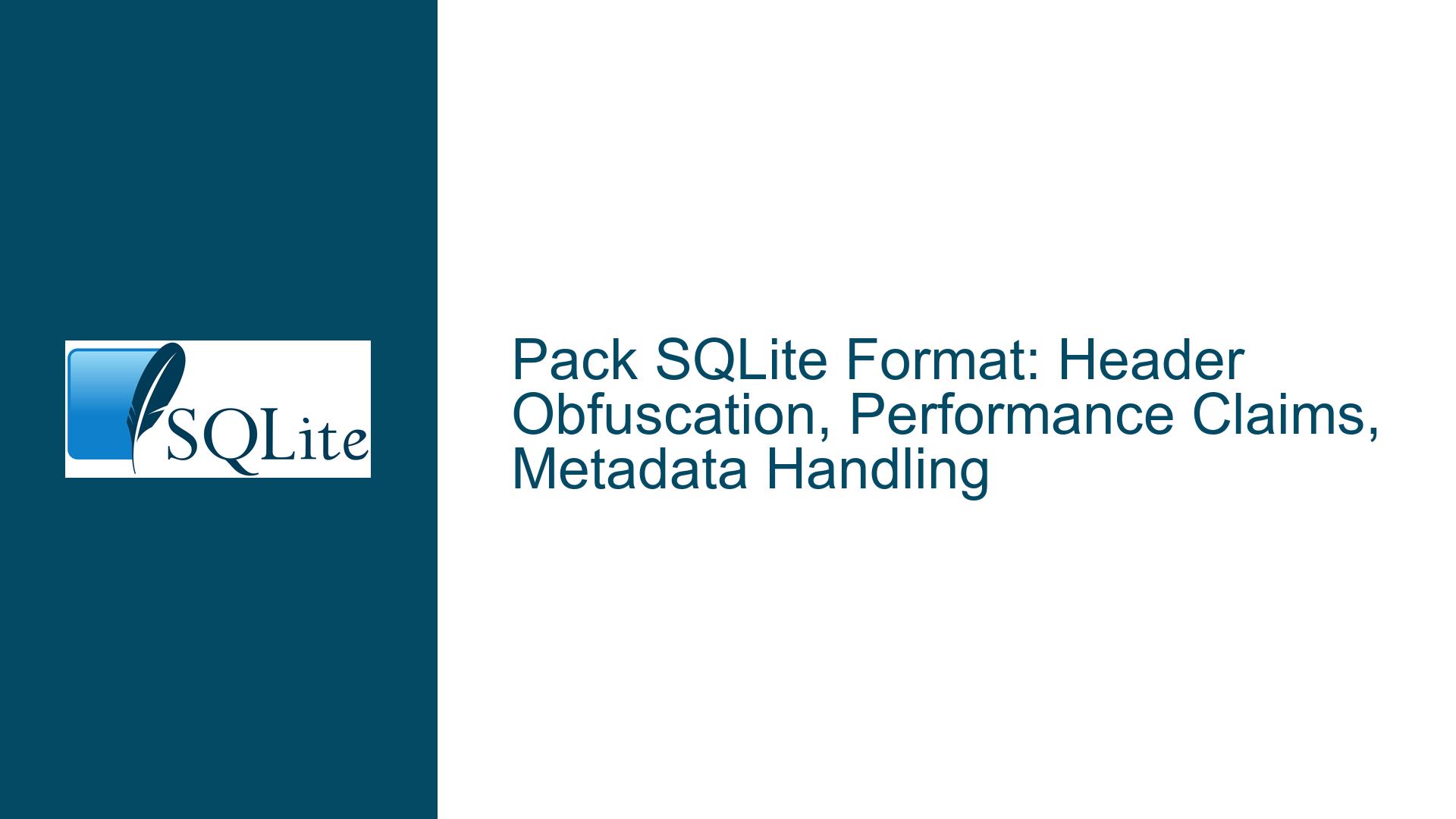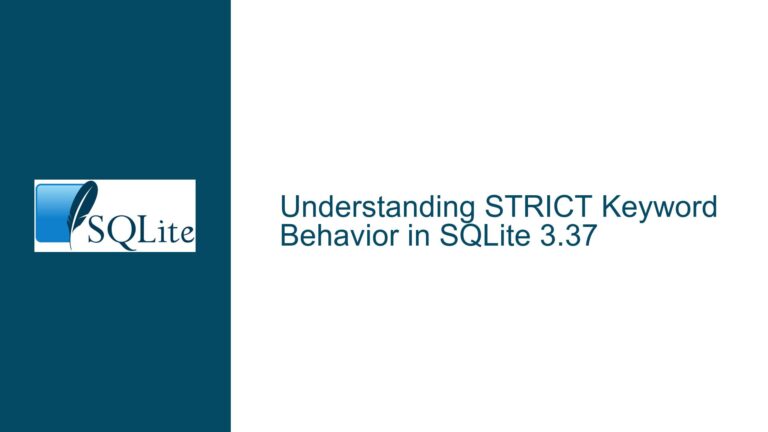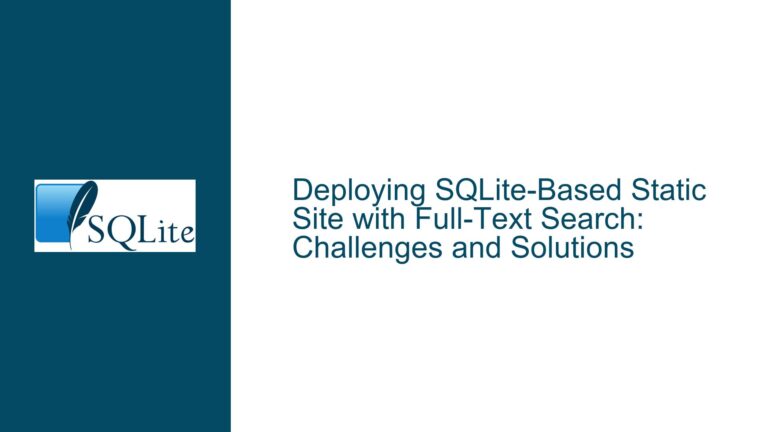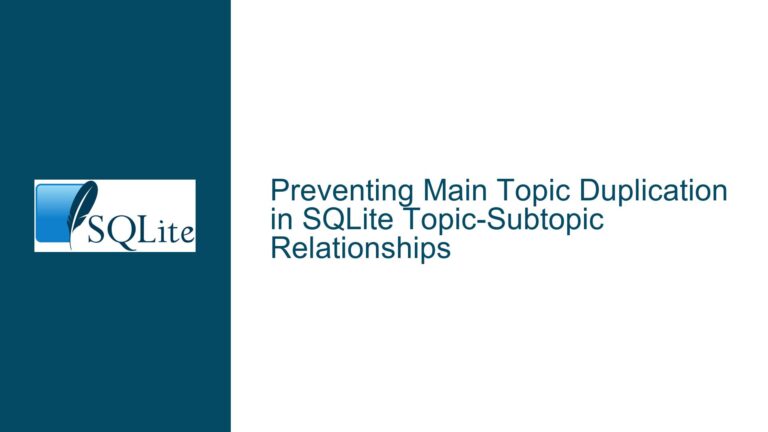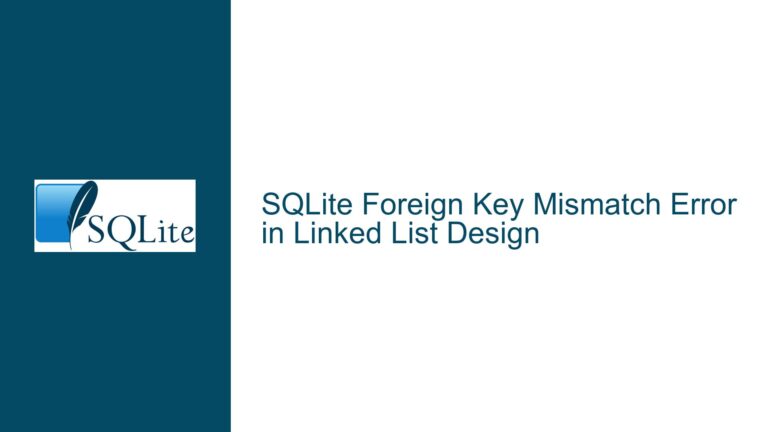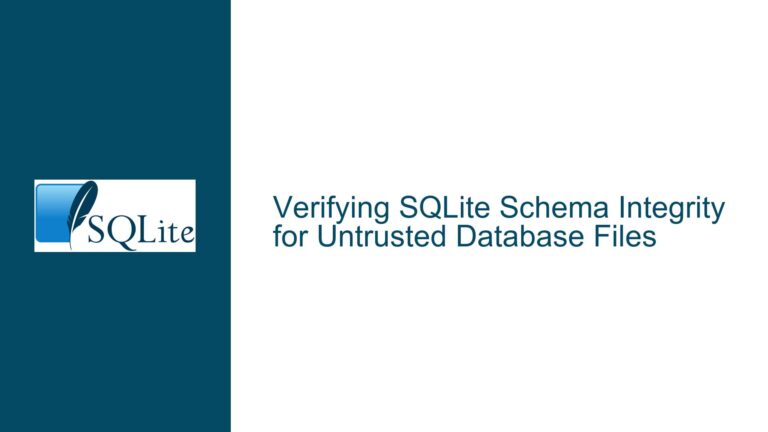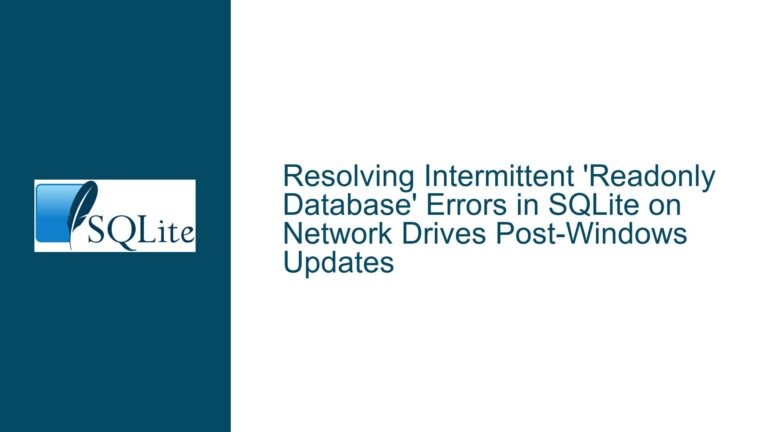Pack SQLite Format: Header Obfuscation, Performance Claims, Metadata Handling
SQLite Header Obfuscation and Compatibility Concerns
Issue Overview
The Pack file format modifies the SQLite header to obscure its underlying database structure. While the developer states this is done to "prevent mistakes and future compatibility issues," this design choice fundamentally breaks compatibility with standard SQLite tooling. Users cannot directly open Pack files in SQLite CLI tools, GUIs, or libraries without first converting them via Pack’s proprietary --transform-to-sqlite3 flag. This obfuscation contradicts one of SQLite’s core strengths as a transparent, inspectable file format.
The altered header (replacing SQLite’s "SQLite format 3\0" signature with "Pack. …") prevents immediate recognition of the file as an SQLite database. While the developer argues this avoids burdening the SQLite team with support requests for Pack files, it introduces friction for users who expect direct access to the database structure. Furthermore, the absence of SQLite’s standard header complicates forensic analysis, interoperability with third-party tools, and integration into existing workflows that rely on SQLite’s universality.
Possible Causes
- Intentional Obfuscation for Branding or Control: The header modification positions Pack as a distinct format rather than an extension of SQLite, potentially to avoid perceived support liabilities or to establish a unique identity.
- Misguided Compatibility Strategy: The developer might believe that header changes future-proof the format against SQLite updates, despite SQLite’s backward compatibility guarantees.
- Security Through Obscurity: A flawed assumption that hiding the SQLite nature of the file enhances security, ignoring that obfuscation does not equate to protection.
Troubleshooting Steps, Solutions & Fixes
Adopt SQLite’s Native Identification Mechanisms:
- Use
PRAGMA application_idandPRAGMA user_versionto tag Pack files as SQLite databases while maintaining compatibility. For example:PRAGMA application_id = 123456789; -- Unique ID for Pack PRAGMA user_version = 1; -- Schema version - This allows Pack files to retain SQLite’s header while embedding format-specific metadata.
- Use
Provide Transparent Conversion Tools:
- Bundle the
--transform-to-sqlite3and--transform-to-packcommands as first-class utilities rather than "other options," ensuring users can seamlessly switch between modes without hunting for flags.
- Bundle the
Document Forensic Recovery Procedures:
- Publish a technical note detailing how to manually repair the header (e.g., using a hex editor to restore "SQLite format 3\0" at offset 0) for emergencies where Pack’s CLI is unavailable.
Leverage SQLite’s Page Size and Encoding Settings:
- Configure page sizes, encoding, and other pragmas to optimize for Pack’s use case without breaking header compatibility.
Performance Metrics and Compression Efficiency Validation
Issue Overview
Pack claims unprecedented compression and extraction speeds (e.g., 1.3 seconds to pack 1.25GB of Linux source code), outperforming established formats like ZIP, RAR, and 7z. However, these benchmarks lack critical context:
- Multi-threaded vs. Single-threaded Execution: Pack’s default use of multi-threading (4 cores in the test) skews comparisons against single-threaded tools like
tar.gzor SQLar. - Compression Algorithm Disparities: Zstandard (used by Pack) is inherently faster than DEFLATE (ZIP) or LZMA (7z), but apples-to-apples comparisons require disabling compression entirely to isolate I/O efficiency.
- Chunking Strategy: Pack’s
Contenttable stores data in chunks, enabling parallel compression but complicating direct comparison with monolithic blob approaches like SQLar.
Possible Causes
- Ambiguous Benchmarking Methodology: The absence of single-threaded, compression-disabled benchmarks makes it impossible to isolate Pack’s I/O optimizations from Zstandard and multi-threading advantages.
- Overhead Miscalculations: SQLite’s BLOB storage and page management introduce overhead that may offset gains from parallel processing.
- File System Caching Artifacts: Warm-state tests (mentioned in the discussion) might exaggerate speeds due to cached file data.
Troubleshooting Steps, Solutions & Fixes
Standardize Benchmarking Conditions:
- Run tests with:
- Single-threaded mode: Disable multi-threading to compare CPU-bound performance.
- Compression disabled: Use
ZSTD_compress(NULL, ...)passthrough to measure raw I/O throughput.
- Example command:
pack --threads 1 --compression-level 0 ./test/
- Run tests with:
Publish I/O Profiling Data:
- Use tools like
strace(Linux) or Procmon (Windows) to trace system calls, quantifying time spent on:- File enumeration (
opendir/readdir). - Read/write operations.
- SQLite transaction commits.
- File enumeration (
- Use tools like
Validate SQLite Configuration:
- Ensure Pack enables SQLite’s
mmapandWALmode for large datasets:PRAGMA mmap_size = 268435456; -- 256MB PRAGMA journal_mode = WAL; - Monitor page cache hits/misses with
PRAGMA cache_stats.
- Ensure Pack enables SQLite’s
Compare Chunking Strategies:
- Benchmark varying
Contentchunk sizes (e.g., 64KB vs. 1MB) to identify optimal balance between compression ratio and random-access latency.
- Benchmark varying
Metadata Exclusion and Schema Design Implications
Issue Overview
Pack’s schema intentionally omits file metadata (timestamps, permissions, extended attributes), limiting its utility as a general-purpose archival format. The Item table includes only ID, Parent, Kind, and Name, which is insufficient for bit-perfect backups or cross-platform data recovery. This design choice simplifies the schema but clashes with user expectations set by tar, zip, and even SQLar (which stores mode, mtime, and sz).
Possible Causes
- Philosophical Minimalism: The developer prioritizes simplicity and universality over platform-specific metadata compatibility.
- Compression Efficiency Focus: Metadata fields could reduce compression ratios by introducing non-redundant data.
- Security Concerns: Storing metadata might expose sensitive information (e.g., file ownership on shared systems).
Troubleshooting Steps, Solutions & Fixes
Add Optional Metadata Tables:
- Introduce a
Metadatatable with foreign keys toItem, allowing extensible key-value pairs:CREATE TABLE Metadata ( ItemID INTEGER REFERENCES Item(ID), Key TEXT CHECK(Key IN ('mtime', 'mode', 'owner')), Value BLOB, PRIMARY KEY (ItemID, Key) ) STRICT; - Use
STRICTmode to enforce type consistency.
- Introduce a
Leverage SQLite’s Extension Mechanisms:
- Register a
pack_metadata()SQL function to decode/encode metadata blobs into structured formats like JSON or CBOR.
- Register a
Implement Cross-Platform Metadata Translation:
- Map POSIX
st_modeto Windows file attributes (and vice versa) during extraction, using fallback values where direct equivalents are absent.
- Map POSIX
Adopt xxHash for Integrity Verification:
- Store
xxh3_64hashes of metadata and content chunks to detect tampering:ALTER TABLE Content ADD COLUMN Hash BLOB; - Use triggers to auto-compute hashes on insert/update.
- Store
Document Metadata Trade-offs Explicitly:
- Provide a clear rationale for metadata exclusion in Pack’s documentation, guiding users toward alternative formats if metadata preservation is critical.
This guide addresses the core technical controversies surrounding Pack’s SQLite integration, offering actionable solutions to reconcile its innovative design with SQLite’s ethos of transparency and interoperability.
